Trafford Grammar Schools Consortium 11 plus guide

Are you considering a grammar school in Greater Manchester for your child? We’ve collated everything you need to know about admissions.
Key takeaways:
- Find out more about grammar schools in Greater Manchester
- Learn about the Trafford Grammar Schools Consortium 11 plus exam
- Discover which subjects your child will be tested on
- Plus, get exclusive resources to help your child prepare!
What is the Trafford 11 plus?
The Trafford Grammar Schools Consortium is a group of 5 grammar schools in the Trafford borough of Greater Manchester. All of the schools in the Consortium use the same selective test known as an 11 plus exam. This means that if you’re interested in more than one grammar school in the Consortium, your child only has to take the exam once.
The Trafford 11 plus takes place in September in Year 6. Children who were born between 1st September 2014 and 31st August 2015 will take the Trafford 11 plus on Monday 15th September 2025 for Year 7 entry in September 2026.
Which schools use the Trafford 11 plus exam?
There are seven grammar schools in Greater Manchester. Five of these schools are members of the Trafford Grammar Schools Consortium. They all use the same 11 plus exam. These schools are:
- Altrincham Grammar School for Boys (boys)
- Altrincham Grammar School for Girls (girls)
- Sale Grammar School (mixed)
- Stretford Grammar School (mixed)
- Urmston Grammar School (mixed)
There are two grammar schools in Greater Manchester that have their own admissions arrangements. These schools aren’t members of the Trafford Grammar Schools Consortium:
- Saint Ambrose College (boys)
- Loreto Grammar School (girls)
Dates for your diary
The 2026 dates for the Trafford 11+ have not been released. Information is usually published during the summer term, and we will update this page when it becomes available.
- Thursday 24th April 2025: Trafford 11 plus registration opens at midday
- Thursday 8th May 2025: Altrincham Grammar School for Boys open evening
- Wednesday 18th June 2025: Urmston Grammar School open evening
- Thursday 19th June 2025: Altrincham Grammar School for Girls open evening
- Friday 20th June 2025: Trafford 11 plus registration closes at midday
- Thursday 26th June 2025: Stretford Grammar School open evening
- Thursday 3rd July 2025: Sale Grammar School open evening
- Thursday 4th September 2025: final exam details are sent to registered families by this date
- Monday 15th September 2025: Trafford 11 plus exam
- Mid-October 2025: parents receive Trafford 11 plus results
- Friday 31st October 2025: national deadline to apply for secondary school places
- Monday 2nd March 2026: secondary school national offers day
Dates can vary, so always check with your target schools!
What's on the Trafford 11 plus?
The Trafford Grammar Schools Consortium 11 plus consists of two one-hour papers provided by GL Assessment. Your child takes both papers on the same day with a short break in between.
Your child will have a question booklet and separate answer sheets. All the questions in both papers are multiple-choice, so your child needs to mark the answer options they think are correct on the answer sheets.
Both papers start with an introduction and practice examples. A few minutes are allocated at the start of each test for your child to listen to instructions and complete these practice questions.
The questions assess a mix of maths, verbal reasoning and non-verbal reasoning. While maths is taught at school, verbal and non-verbal reasoning are not on the national curriculum. Your child might be unfamiliar with these types of questions.
Verbal reasoning
Verbal reasoning tests your child's ability to solve problems with written information. This could include letters, words, symbols and numbers.
Your child might need to choose certain words to complete a sentence and show their knowledge of words and their meanings. Key areas in verbal reasoning tend to include vocabulary, finding words, building words, codes, and sequence logic.
The test may also include a comprehension exercise. This will assess your child's grammar, punctuation and vocabulary skills. Your child might need to choose the best words to complete a sentence, find synonyms and antonyms, and spot mistakes in sentences.
Non-verbal ability
Non-verbal reasoning involves solving problems with visual information. This includes shapes, diagrams and pictures. Non-verbal reasoning tests skills such as logic, maths, problem-solving, and spatial awareness.
Common non-verbal reasoning questions involve interpreting and manipulating 2D and 3D shapes. Your child might see questions like:
- finding the relationship between shapes and sequences of shapes
- spotting common features from a set of shapes, and applying them to a new shape
- solving codes
Maths
The Trafford 11 plus maths questions are based on the Key Stage 2 curriculum. Questions test the maths content that is taught in school up to the start of Year 6.
These topics include:
- number (such as the four operations, place value and fractions)
- measurement
- geometry
- statistics
The questions are likely to be a bit more advanced than your child is used to and might involve multi-step problem-solving. Practice with arithmetic and problem-solving questions, rapid recall of number facts, and written calculation will give your child a good foundation for these questions.
Is your child ready for the 11+?
See where they stand in minutes. Atom’s free 11+ baseline tests give you an instant breakdown of their strengths and gaps. Know exactly what to focus on next and start preparing with direction, not uncertainty.
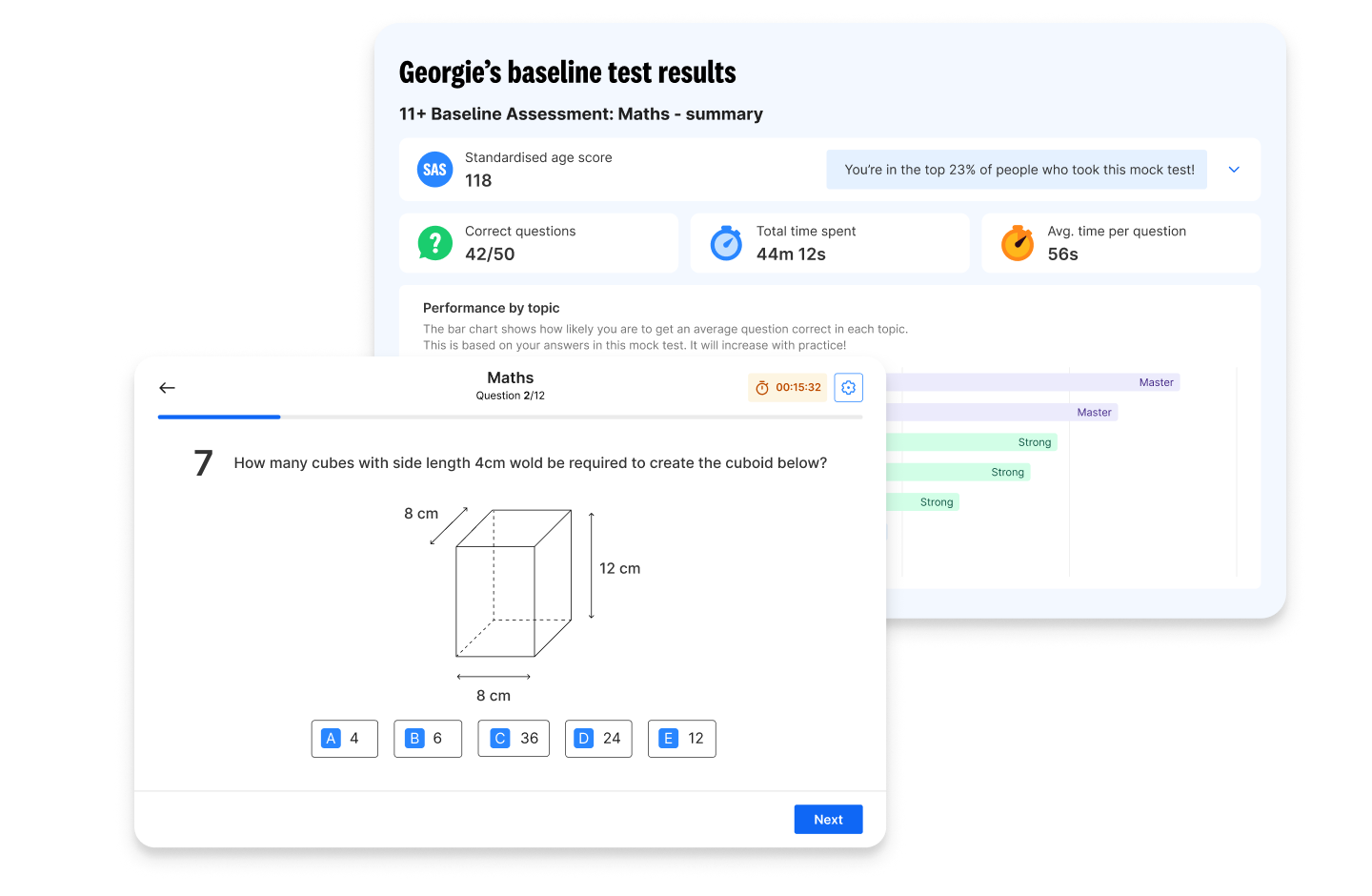
How is the Trafford 11 plus scored?
After the test, your child’s answer sheets are marked using Optical Mark Recognition (OMR). This technology picks up the marks your child has made to indicate which answers they think are correct. Your child receives a mark for every correct answer.
These marks are then age-standardised for each of the three sections in the exam (verbal, maths, and non-verbal). Age-standardisation is a common practice in 11 plus scoring and ensures younger children aren’t disadvantaged.
Your child will receive one total standardised mark.
What's the pass mark for the Trafford 11 plus?
The qualifying mark for schools in the Trafford Consortium has historically been at least 324. Some schools' admissions criteria allow automatic allocation for the top 20 scoring pupils.
Achieving 334 or higher doesn't guarantee that your child will be offered a place at their target school. Grammar schools are often oversubscribed with qualified children. When this happens, schools use admissions criteria to prioritise children for places. For example, children who live within a certain priority area might be prioritised over others.
For detailed information about your target school’s pass mark, make sure to check the admissions policy for your child’s entry year.
How to apply to Trafford grammar schools
If you're considering a grammar school in Greater Manchester for your child, it's a good idea to speak to your child's teacher first.
Grammar schools are academically-selective and select children working towards the top of their year group. Your child's teacher will be able to indicate whether they think your child will be able to keep up with the pace in a grammar school.
1. Register for the Trafford 11 plus
If you would like your child to be considered for a place at one of the five Trafford Consortium grammar schools, you’ll need to register them to take the Trafford 11 plus.
Registration for the 2025 exam will open on Thursday 24th April 2025 on the participating schools’ websites. You’ll need to complete your child’s application before Friday 20th June 2025.
2. Apply for school places
Your child’s test results will be sent to you in mid-October 2025. You’ll find out if your child has achieved the minimum score necessary for admission to the school.
You can use these results to decide which schools to name on your secondary school common application form. Before listing a school on your form, check its admissions policy and make sure your child is eligible.
The application form must be submitted to your home local council by the deadline on 31st October 2025.
3. National school offer day
On Monday 2nd March 2026, you will find out which school your child has been allocated a place at. They will be allocated a place at your highest-preferred school for which they meet the entry criteria and which has places available.
If no places are available at your preferred schools, they will be offered a place at another school in your area. You can appeal via an independent panel. Information about how to appeal will be sent to you by your local authority along with your school offer on National Offers Day.
How can I help my child prepare for the Trafford 11 plus?
The 11 plus exam is designed to be challenging. Here are our top tips to help your child prepare for the [Lincolnshire grammar schools’ entrance test].
Stay on track with a clear plan
One of the hardest parts of 11+ preparation is knowing what to focus on, when, and how to make steady progress without it taking over family life.
A clear, structured plan helps your child feel less overwhelmed and more in control. It ensures they build skills in the right order, cover everything they need, and avoid last-minute cramming.
Atom’s exam plan makes this easier. Enter your child’s target schools and exam dates, and we’ll create a personalised weekly plan tailored to the topics they’ll be tested on. It shows them what to work on and when, adapts as they improve, and helps them build progress in a calm, manageable way — little and often.
That means less guesswork for you, less stress for them, and a clearer path all the way to exam day.
Build smart exam technique
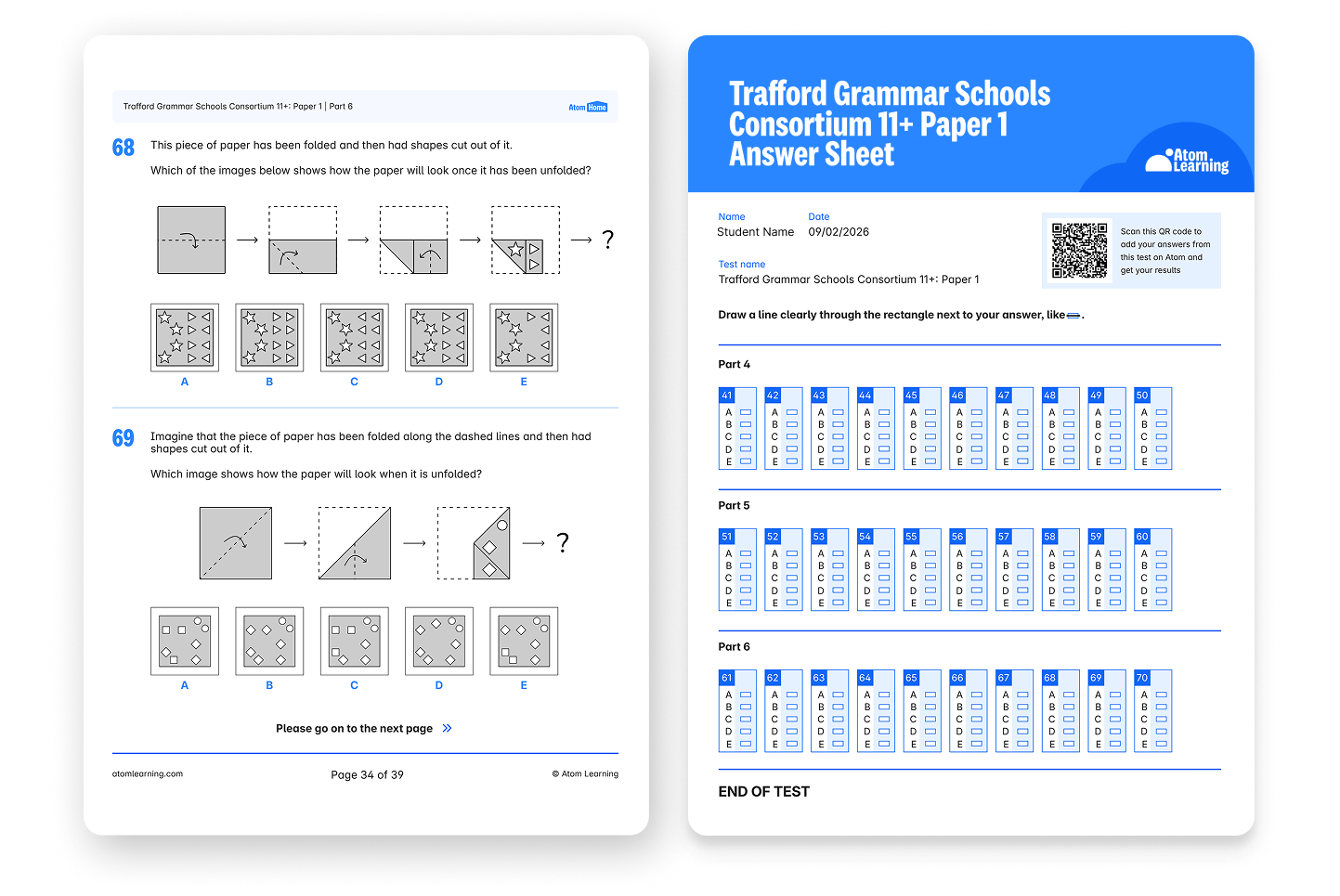
As your child’s knowledge grows, practice tests can help them feel more comfortable with the real exam format.
Atom’s 11+ practice papers are exact replicas of real 11+ exams. They’re also unlimited – you can download the same paper again and again, and your child will get new questions each time. This helps them practise without repeating the same content.
We’ve made marking easy for you, too. Simply photograph your child’s answer sheets and upload them to Atom. The papers are marked instantly, showing your child’s standardised age score (SAS), where they’re doing well, and what they should focus on next. You’ll also learn how they compare to other children applying to the same school.
Encourage regular reading
Strong reading skills play a big role in 11+ preparation.
Encourage your child to read every day, even for just 10–15 minutes. The key is variety. Mix fiction and non-fiction, different genres, and a range of authors. This helps them become more confident in understanding tone, purpose, and meaning across different texts.
Over time, regular reading will:
- broaden their vocabulary
- improve comprehension and inference
- build confidence in tackling unseen texts
And just as importantly, it can help them enjoy reading — not just see it as exam preparation.
Looking for inspiration? Atom’s recommended reading lists have suggestions spanning fiction and non-fiction for Years 3–6.
Celebrate progress, not just scores
When you’re supporting your child through 11+ preparation, what really matters is knowing they’re moving in the right direction — not just how they scored on a single test.
Atom’s progress tracking gives you a clear, simple picture of how your child is doing in each topic and the direction they’re moving in. You can see where they’re on track, where they might need more practice, and spot progress as it happens.
That makes it easier to give meaningful encouragement, keep motivation steady, and focus on what matters most: consistent improvement, not just one-off results.
Take control of your child’s 11+ preparation.
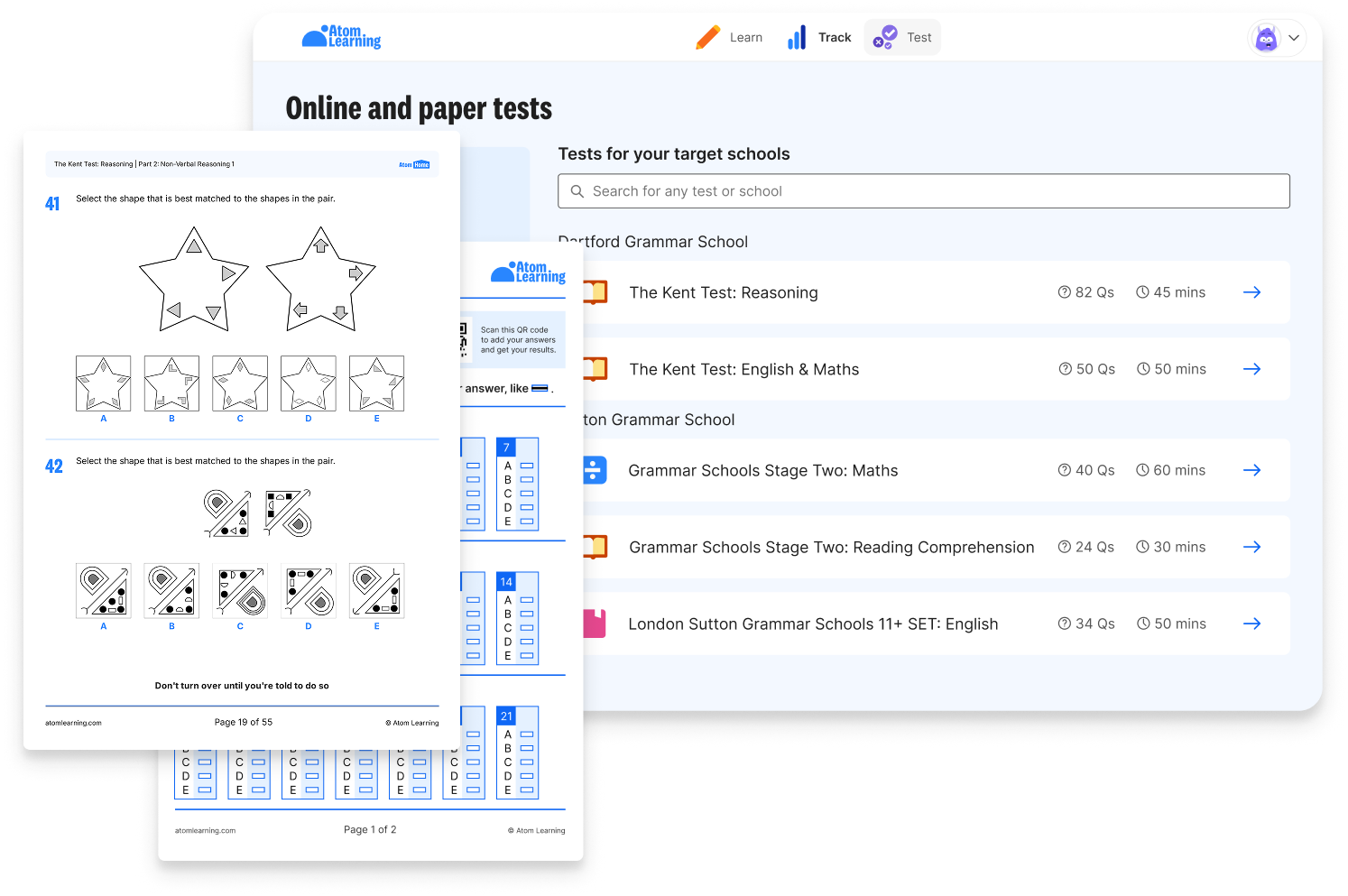
Not sure if your child is on track for the grammar school 11+? You don’t need to guess what to cover or whether they’re ready. Atom shows you exactly what to practise each week and how they’re performing, so you can stay ahead of the process without the stress.
- Follow personalised weekly exam plans that show them what to learn next.
- Download replica 11+ practice papers and upload a photo for instant, stress-free marking.
- Track progress and see how they compare to others applying to the same schools.
Start your free trial and help your child feel fully prepared for the 11+.


